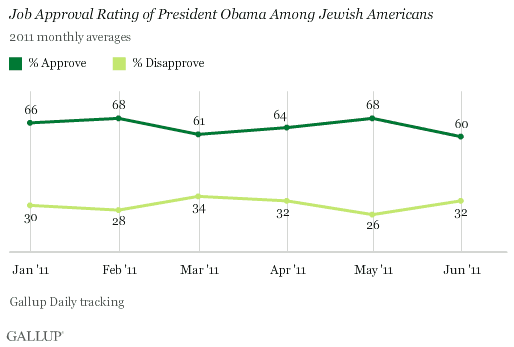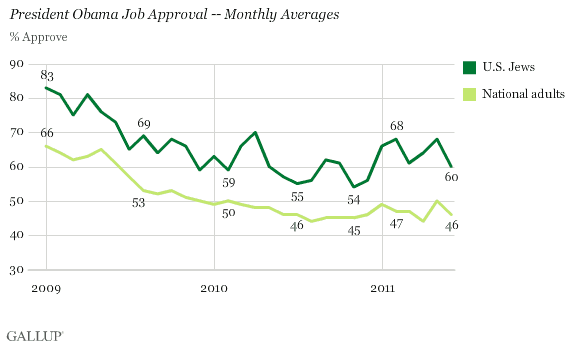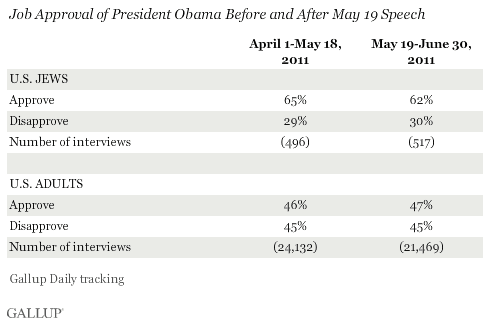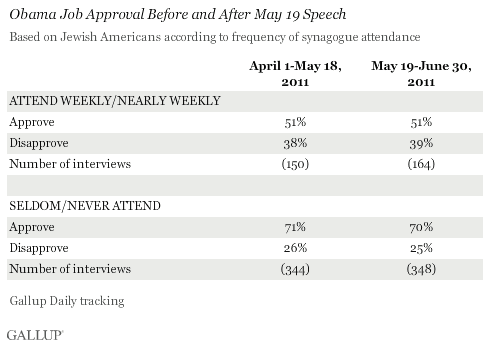PRINCETON, NJ -- Jewish Americans gave President Barack Obama a 60% job approval rating in June, down from 68% in May, but statistically unchanged from 64% in April. Thirty-two percent of U.S. Jews now disapprove of the job Obama is doing, similar to their 30% average thus far in 2011.

Gallup's monthly trend in Jewish approval of Obama continues to roughly follow the path of all Americans' approval of the president, more generally, as it has since Obama took office in January 2009. The 14-percentage-point difference in the two groups' approval ratings in June -- 60% among U.S. Jews vs. 46% among all U.S. adults -- is identical to the average gap seen over the past two and a half years. However, the monthly graph is somewhat variable due to the lower monthly sample saize of Jewish respondents (around 350).
Approval among all Americans was elevated in May, but that was principally due to the rally in public approval of Obama following Osama bin Laden's death on May 1 which largely dissipated by mid-June.

Israel Speech Not a Watershed in Jewish Views Toward Obama
President Obama delivered a major speech at the State Department on May 19 in which he articulated his support for a settlement to the Israeli-Palestinian conflict based on a return to Israel's 1967 borders. His remarks provoked a highly negative reaction from Israeli Prime Minister Benjamin Netanyahu, as well as from many high profile supporters of Israel in government, politics, and media.
Gallup cannot say whether the speech had an immediate impact on the views of Jewish Americans toward the president nationally, as sample sizes for this group in Gallup Daily tracking are too small to isolate short time periods.
However, aggregated Gallup Daily tracking interviews for the month and half periods prior to and following the speech show no significant nor sustained shift in Jewish Americans' views toward Obama. Sixty-five percent approved of him for the April 1-May 18 time period, and 62% approved from May 19-June 30. Across the two time periods, approval was also essentially flat among all U.S. adults.

Gallup also finds no change in the views of the more than 300 Jewish Democrats interviewed in each period, with 86% approving of Obama prior to the speech and 85% after.
Jews who regularly attend synagogue are less supportive of Obama than those who attend less frequently or who are non-practicing -- reflecting the generally more conservative views of the former group. However, the degree to which each group supports Obama also did not change during the periods prior to and following the May 19 speech.

Bottom Line
The absence of a significant retreat in Jewish Americans' approval of Obama since his Mideast policy speech contrasts with a recent commentary by Ben Smith for Politico, titled "Obama May Be Losing the Faith of Jewish Democrats," in which he suggests a "tipping point" may have been reached with Jews who have long harbored concerns about the president's support of Israel. That conclusion, based on Smith's conversations with "center-left American Jews and Obama supporters -- and many of them Democratic donors" may apply to certain politically active members of the Jewish-American community, but according to recent Gallup trends, is not reflective of the views of Jewish AMericans more generally.
Survey Methods
Results are based on telephone interviews conducted as part of Gallup Daily tracking. The monthly averages reported here span from January 2009 through June 2011. Those based on national adults generally include more than 15,000 interviews and have a maximum margin of sampling error of ±1 percentage point. Monthly results based on Jewish Americans are generally based on more than 350 interviews with a maximum margin of sampling error of ±7 percentage points.
The pre-/post-May 19, 2011, results are based on over 21,000 interviews with national adults and roughly 500 adults with Jewish Americans. The national adult results have a maximum margin of sampling error of ±1 percentage point. The Jewish results have a maximum margin of sampling error of ±6 percentage points.
Interviews are conducted with respondents on landline telephones and cellular phones, with interviews conducted in Spanish for respondents who are primarily Spanish-speaking. Each sample includes a minimum quota of 400 cell phone respondents and 600 landline respondents per 1,000 national adults, with additional minimum quotas among landline respondents for gender within region. Landline telephone numbers are chosen at random among listed telephone numbers. Cell phones numbers are selected using random digit dial methods. Landline respondents are chosen at random within each household on the basis of which member had the most recent birthday.
Samples are weighted by gender, age, race, Hispanic ethnicity, education, region, adults in the household, and phone status (cell phone-only/landline only/both, cell phone mostly, and having an unlisted landline number). Demographic weighting targets are based on the March 2010 Current Population Survey figures for the aged 18 and older non-institutionalized population living in U.S. telephone households. All reported margins of sampling error include the computed design effects for weighting and sample design.
In addition to sampling error, question wording and practical difficulties in conducting surveys can introduce error or bias into the findings of public opinion polls.
For more details on Gallup's polling methodology, visit https://www.gallup.com/.
